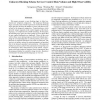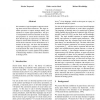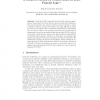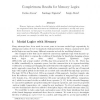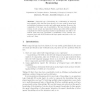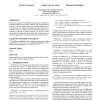142
Voted
FUZZIEEE
2007
IEEE
15 years 9 months ago
2007
IEEE
— The Semantic Web can be viewed as largely about “Knowledge meets the Web”. Thus its vision includes ontologies and rules. A key requirement for the architecture of the Sema...
117
Voted
DATE
2007
IEEE
15 years 9 months ago
2007
IEEE
This paper presents a new blocking logic to block unknowns for temporal compactors. The proposed blocking logic can reduce data volume required to control the blocking logic and a...
113
Voted
LICS
2008
IEEE
15 years 9 months ago
2008
IEEE
We present a logic for algebraic effects, based on the algebraic representation of computational effects by operations and equations. We begin with the a-calculus, a minimal calcu...
116
Voted
TARK
2009
Springer
15 years 9 months ago
2009
Springer
We introduce a logic designed to support reasoning about social choice functions. The logic includes operators to capture strategic ability, and operators to capture agent prefere...
121
Voted
TABLEAUX
2009
Springer
15 years 9 months ago
2009
Springer
We study the logic of comparative concept similarity CSL introduced by Sheremet, Tishkovsky, Wolter and Zakharyaschev to capture a form of qualitative similarity comparison. In thi...
101
Voted
LPNMR
2009
Springer
15 years 9 months ago
2009
Springer
Abstract. The logic FO(ID) uses ideas from the field of logic programming to extend first order logic with non-monotone inductive definitions. The goal of this paper is to exten...
165
Voted
LFCS
2009
Springer
15 years 9 months ago
2009
Springer
Memory logics are a family of modal logics in which standard relational structures are augmented with data structures and additional operations to modify and query these structure...
154
Voted
FROCOS
2009
Springer
15 years 9 months ago
2009
Springer
Temporal logic of knowledge is a combination of temporal and epistemic logic that has been shown to be very useful in areas such as distributed systems, security, and multi-agent s...
126
Voted
ECSQARU
2009
Springer
15 years 9 months ago
2009
Springer
Abstract. This paper presents a method which allows for merging beliefs expressed thanks to logic programming with stable model semantics. This method is based on the syntactic mer...
124
Voted
ATAL
2009
Springer
15 years 9 months ago
2009
Springer
We present a logic for reasoning about strategic games. The logic is a modal formalism, based on the Coalition Logic of Propositional Control, to which we add the notions of outco...

